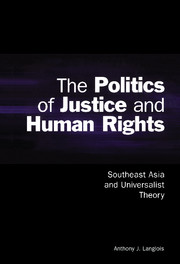Book contents
3 - Human Rights: Political Reality, Philosophical Problem
Published online by Cambridge University Press: 05 July 2014
Summary
Understanding the development of the idea of universal human rights is the first step in reconceptualising human rights. Only by facing the historical and contingent nature of the concept can we make use of it in a way that is both just and philosophically sound. This approach is taken to be just because it avoids two a priori assumptions. First, that intellectual constructs developed by one dominant culture emerging from its own historically and philosophically contingent milieu are necessarily applicable to all societies and cultures. This assumption ignores and disdains the possibility that in and from other less dominant societies and cultures equally valuable constructs might be found and used. Second, a historically aware approach cautions against the opposite assumption: that it is not possible for an intellectual construct from one specific culture and society to emerge as the most effective tool for achieving a particular goal across all cultures. This approach is also taken to be philosophically sound, because the assumption that the concept of universal human rights is ahistorical and evident in all cultures and societies is demonstrably false. Any argument supporting the use of the concept of universal human rights premised on assumptions that can be empirically proven false will not be sustainable and may subvert its own cause.
The argument developed in the remainder of the book is an attempt to construct a theoretical understanding of human rights that might act as a common framework in the context of pluralism. While the argument is premised on the recognition of the historicity and non-universality of concepts such as human rights, it is not an argument for cultural or philosophical relativism. Rather, it seeks to provide a framework within which competing non-relativist systems of thought and being can come to a place of agreement about how they live together.
- Type
- Chapter
- Information
- The Politics of Justice and Human RightsSoutheast Asia and Universalist Theory, pp. 73 - 99Publisher: Cambridge University PressPrint publication year: 2001

